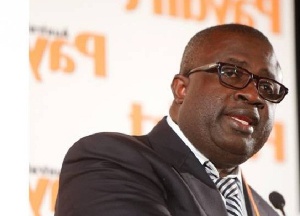 Dr. Toni Aubynn,Chief Executive of Minerals Commission
Dr. Toni Aubynn,Chief Executive of Minerals Commission
Chief Executive of Minerals Commission, Dr. Toni Aubynn, has admitted that more than a 1,000 small-scale gold mining companies currently operating have not been ratified by Parliament.
He said all the companies have not met the constitutional requirements to have their environmental gold mining permit licenses ratified by the legislative body.
Article 268 of the 1992 Constitution states that “Any transaction, contract or undertaking involving the grant of a right or concession by or on behalf of any person including the Government of Ghana, to any other person or body of persons howsoever described, for the exploitation of any mineral, water or other natural resource of Ghana made or entered into after the coming into force of this Constitution shall be subject to ratification by Parliament.”
But speaking on Joy FM in Accra recently, Dr. Aubynn asserted that small-scale mining companies “haven’t done that.”
He said whilst the large mining companies have consistently ratified their agreements in consonance with the constitution, the small-scale companies haven’t.
“I think there is an institutional failure there. They should go to Parliament, they are thousands but they should go according to the Constitution,” he told Joy FM.
The Minerals Commission boss whose institution supervises mining in the country said practical reality may have been the reason the licenses are not ratified.
“For the large-scale companies, some of them it took about nine years for [their agreements] to be ratified.
“The point is that if we would have this example of back-and-forth which took about nine years for some concessions to be ratified, then if the small-scale miners who are impatient…have to go through that I think that will be an issue,” he noted.
There is an historic national anger and mobilisation against the menace of illegal mining.
The involvement of Chinese in the illegal activity appears to have exacerbated the problem.
The Ghana Water Company Limited (GWCL) has made a bleak projection that the country may be forced to import water for consumption in the next decade if the current rate of pollution of water sources continues.
This frightening assessment appears to have jolted many Ghanaians into action with media organisations leading the campaign to end galamsey in Ghana.
Attempts have been made to draw a distinction between illegal mining and small-scale mining which is legal because the operators have obtained licenses from the Minerals Commission and the Environmental Protection Agency and signed by the minister.
But Dr. Aubynn confirmed these licenses were not ratified by Parliament as required by law.
“I also must say that those who have our licenses, most of them – I don’t know whether it is most or not – are likely to be doing it right because our people go to them on regular basis,” he said.
For Dr. Aubynn, the problem is the “thousands who do [mine] illegally.”
“But what the constitution says must be respected.”
According to him, there is a gap, but stressed “there is a reason for the gap; if there is insistence for all thousands to be brought to Parliament, so be it.
…But remember that before they go to Parliament, the sub-committee has to look at it; look at these thousands before it goes to the floor of Parliament and all that.”